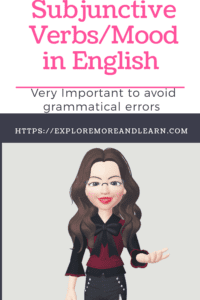
In this post I’ll discuss about the subjunctive verbs and mood in English.The subjunctive is a verb form or mood used to express things that could or should happen. It is used to express wishes, hopes, commands, demands or suggestions. We use the subjunctive mainly when talking about events that are not certain to happen. For example, we use the subjunctive when talking about events that somebody: wants to happen. In this post I’ll discuss about the subjunctive verbs and mood in English.
For example: I suggest that he stay here today.
The Subjunctive Mood
The subjunctive mood expresses an unreal situation. It expresses a possibility, a suggestion, a wish, something imaginary, or the way that you want something to be. The subjunctive mood is very rare in English.
Subjunctive Verbs
Advise, Demand, Prefer, Require, Ask, Insist, Propose, Stipulate, Command, Urge, Recommend, Suggest, Decree, Order, Request.
The Subjunctive always comes in the simple/base form or in to be form of verb which is very special.
Subjunctive in the simple base form of verb
The Structure of Subjunctive Mood:
Sub (1) + Subjunctive Verb (any tense) + that + Sub (2) + Base Form of Verb + Complement
Example
It is recommended that he work hard.
I suggest that she sleep well.
They propose that he go there.
He insisted that she write on the paper.
It may sound grammatically incorrect to you as we use s/es with the base form of verb in simple present tense. Right? But here in the subjunctive we use simple base form of the verbs by dropping S or ES.
Here, the conjunction ‘that’ is important with the subjunctive verbs. Without ‘that’, the structure changes a lot and does NOT follow the mood of subjunctives.
She advised me to drive slow. (No subjunctive without conjunction that)
However, the subjunctive verbs with the conjunction ‘that’ always follow the subjunctive mood (first structure).
Note that the verb in the that-clause means after conjunction that, stays the same even though the tense of the verbs before that clause may change.
Subjunctive in Negative form
It is very important to notice the use of subjunctive in the negative form of sentences. Add not before the verb to make the subjunctive negative. Don’t use do or does.
I suggest that she not go out tonight.
We ask that he not invite him.
I insisted that he not do anything.
Using the verb To Be in the Subjunctive
The subjunctive is used to express wishes and hypothetical situations using were in place of was even with first and third person singular pronouns like he, she and it. Typically, this type of statement includes the words if or I wish.
If I were a king, I’d buy whole market for you.
I wish I were tall.
If she were you, she’d never leave this job.
I wish she were here!
Friends! If you really learnt something new, post your comments.
Don’t forget to watch the attached video below to understand the subjunctive in a better way. Keep Learning!
- Basic vs Advanced English Vocabulary
- Simple Present Tense Rules with Examples
- 10 Useful Idioms with Meaning and Examples
- Various Ways to Make Requests
- Prepositions Test with Answers
This is awesome…very well explained
Absolutely wonderful ???great job
Thanks!
Very informative post. It was really new for me. Thanks to explain so nicely.
Thanks a lot!